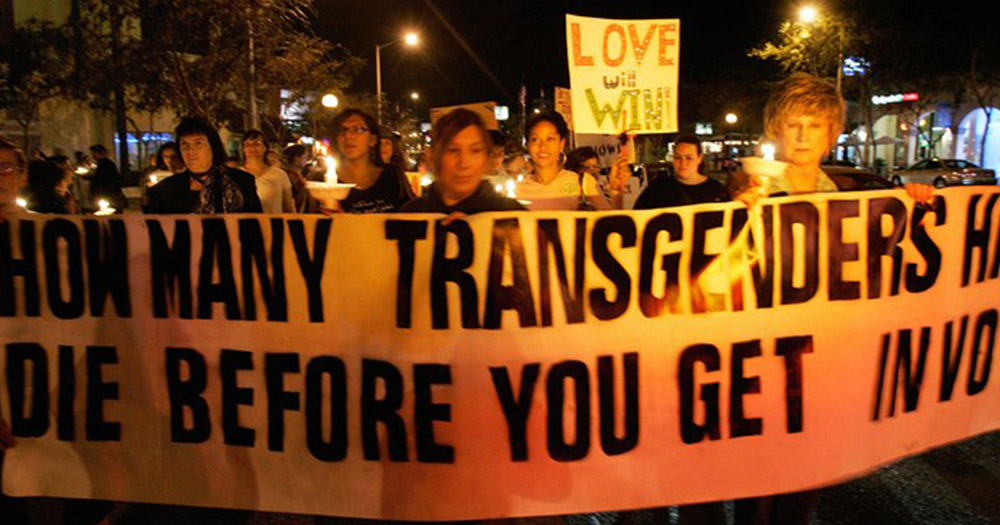Transgender Day of Remembrance will be marking its twentieth anniversary on November 20. Since it was founded by trans advocate Gwendolyn Ann Smith, the day has been observed globally as a powerful stance against anti-transgender violence and a memorial for those who lost their lives.
Across the span of twenty years, the fight for trans equality has been ongoing and faced both triumphs as well as setbacks. Multiple grassroot advocacy groups have been set up to take action against the injustices faced by trans people.
Commemorating Transgender Day of Remembrance is crucial as a way to honour those who have been died due to transphobic crimes. Transrespect Versus Transphobia Worldwide released a new report documenting the murder of 331 trans and gender-diverse people worldwide between October 2018 and September 2019. According to the findings, Brazil had the highest number of transphobic hate crimes with 130 killings reported.
Since 2013, TENI has been running the STAD (Stop Transphobia and Discrimination) campaign to document hate crimes and incidents against trans people in Ireland. The campaign received over 41 reports of violence, harassment, abuse and discrimination in January 2014.
As we honour the lives lost this past year and beyond we are reminded that connection is the most powerful way we can tackle transphobia and work to dismantle the stigma we face in every day life. Talk to each other, check in with your friends and family.#TDOR #TransMentalHealth pic.twitter.com/LMSpE4jULS
— TENI (@TENI_Tweets) November 20, 2019
In 2017, STAD report detailed 62 people experienced transphobic motivated crimes over a 2 year period. Out of 57 transphobic crimes in Ireland, only six were reported to the Garda.
As part of Trans Day of Remembrance 2018 in Ireland, people placed shoes outside the Dáil to “show our government just how many people we have lost to their enforced system of diagnostics and waiting lists.”
Last year, in 2018, a report stated that at least 22 trans people died in the United States because of transphobic violence, further stating that 82% were women of colour, 64% were under the age of 35, and 55% lived in the South.
The first Trans and Intersex Pride Dublin took place in July 2018 as a protest for better healthcare for trans people. One of the organisers, Ollie Bell said, “We wanted to have a Pride that went back to the radical roots of protest,” Ollie says, “[one] that wasn’t over-corporatised, that wasn’t pushing the community activists to the back of the Parade, a protest that would kickstart a movement for trans rights.”
University College Cork became the first college in Ireland to fly the Transgender Pride flag in 2018.
London held its first Trans Pride in April 2019. As stated on the Facebook event page, “We deserve our own pride event, a day to come together and stand in a crowd and feel normal. We hope to make this day special, inclusive, memorable and historical.”
In 2019, This Is Me, a national grassroots campaign, staged a sit-in at the Department of Health building. Earlier in November, National Gender Service at Loughlinstown declared that they misplaced over 100 patient referrals, which further highlights the necessity for improvement in trans healthcare.
***PRESS RELEASE/ANNOUNCEMENT***
This is very important information.
The HSE have finally officially admitted to failures that This Is Me have repeatedly reported for years and Loughlinstown Hospital have repeatedly denied for years.
Please read and RT RT RT! #TransHealthcareNow pic.twitter.com/I9WPdyYoU3— ThisIsMe Campaign (@ThisIsMeIreland) November 6, 2019
On November 16, 2019, a protest commemorating Transgender Day of Remembrance, organised by Trans and Intersex Pride Dublin, was disrupted by a teen shouting transphobic slurs. In light of the situation, a spokesperson from Trans and Intersex Pride Dublin said, “Our unity is our strength, and we remain determined to continue the fight for trans rights alongside the rest of our community.”
Paying tribute to Transgender Day of Remembrance, Gilead Sciences’ TRANScend Community Impact Fund selected 15 transgender organisations to receive a portion of $4.5 million donations, distributed over 2 years. The decision was made under the advisement of a board of trans activists.
Though there is much to celebrate in terms of trans visibility and representation, there is still much work required. On Transgender Day of Remembrance, it is important to look back at how far the community has come but also look forward in support of each other.
© 2019 GCN (Gay Community News). All rights reserved.
Support GCN
GCN is a free, vital resource for Ireland’s LGBTQ+ community since 1988.
GCN is a trading name of National LGBT Federation CLG, a registered charity - Charity Number: 20034580.
GCN relies on the generous support of the community and allies to sustain the crucial work that we do. Producing GCN is costly, and, in an industry which has been hugely impacted by rising costs, we need your support to help sustain and grow this vital resource.
Supporting GCN for as little as €1.99 per month will help us continue our work as Ireland’s free, independent LGBTQ+ media.

comments. Please sign in to comment.